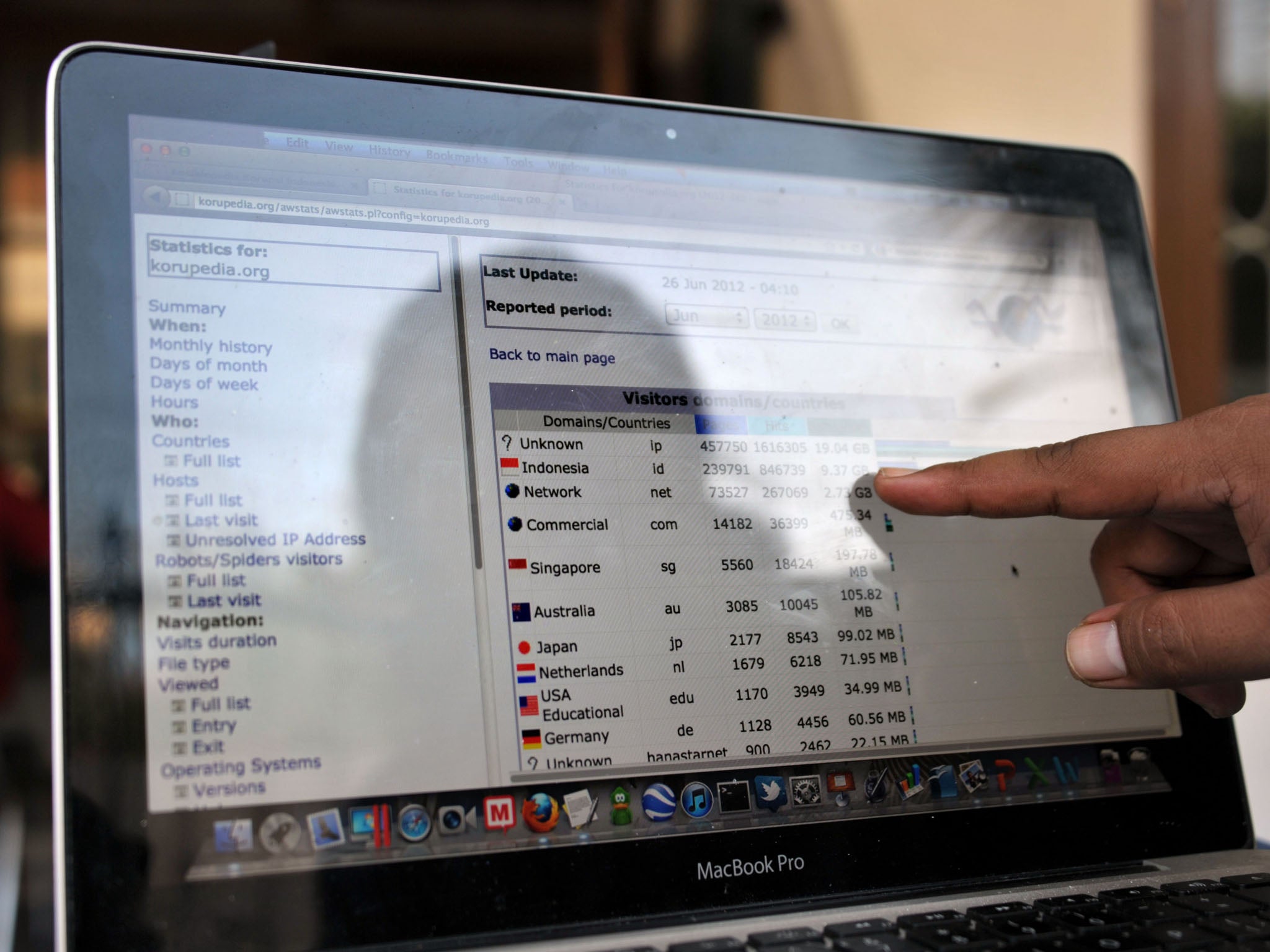Israel wages cyber war with Hamas

Knowledge of computer code is proving to be as important to Israel's conflict with Hamas as the Iron Dome system intercepting rockets from the Gaza Strip.
In a government building in Jerusalem, technicians in civilian clothes sit in front of a bank of screens, trying to deflect millions of attempted attacks on Israel's government websites. A map on the wall shows sites where virtual attacks are being carried out around the world, updating every few seconds. Israel and the Palestinian territories stand out with a big red flame. Extra workers are drafted in.
The clicking of keyboards and mice has already become a hallmark of the conflict's latest flare up that started on Nov. 14 as much as the sound of rocket fire. Aided by supporters abroad and speedy Internet access, the virtual battle is intensifying in tandem with the air attacks as Israelis and Palestinians try to disrupt the flow of information and hack each other's propaganda machines.
"From the very beginning, we called on Palestinian software technicians in Gaza and all over the world to use technology to undermine Israeli websites and pages," Islam Shahwan, the spokesman for the Hamas Ministry of Interior in Gaza, said in an interview from the enclave.
More than 44 million attempts were made to bring down Israeli state websites, Finance Minister Yuval Steinitz said on Nov. 18, standing in the government's cyber war-room.
"Beyond the main military battlefield, there is a secondary arena," Steinitz said. "Israel has been under unprecedented cyber attack."
An Israeli air strike on Nov. 19 hit a 15-floor office building in downtown Gaza City used by the television stations of Hamas, considered a terrorist organization by Israel, the United States and European Union, and Islamic Jihad. The second floor of the complex that houses an Internet and computer services company was also damaged, cutting connection to subscribers.
The building was targeted because of the presence of senior terrorist members there, Israeli army spokeswoman Avital Leibovich said. One of the militants killed in the assault was Ramez Harb, head of Islamic Jihad's media operations, who Israel said was responsible for propaganda for the group.
Its armed wing, called Saraya al-Quds Brigades, said on its website on Nov. 17 that its intelligence department "managed to penetrate data for 5,000 cellular phones belonging to senior Israeli army officers and got their personal data."
The group used the mined information to send warnings via text message, saying "we will make Gaza a graveyard for you and your soldiers and we will turn Tel Aviv in to a massive flame," according to the website.
Cyber-war is one way Gazans can defend themselves, according to Hamas spokesman Fawzi Barhoum.
Hamas seized control of the Gaza Strip in 2007, ending a partnership government with Palestinian Authority President Mahmoud Abbas a year after winning parliamentary elections. Hamas doesn't recognize Israel or any prior peace agreements.
"We are seeing a concentrated effort to attack Israeli sites," said Gabi Siboni, head of the cyber warfare program at the Institute for National Security Studies in Tel Aviv. "When they succeed with the denial-of-service attacks of government websites, they might put substantial effort into trying to penetrate operational systems and critical infrastructure."
Such denial-of-service attacks overwhelm websites with requests until they shut down.
Many of the barrages on Israeli sites originated from abroad, including the U.S. and Europe, as pro-Palestinian activists joined in, said Finance Minister Steinitz. Others come from the West Bank, Gaza, or Israeli computers on which stealth programs have been installed so they can be controlled remotely, said Ofir Ben-Avi, director of Israel's e-government.
Hamas also wasn't immune from attack. The Hamas Interior Ministry said on Nov. 18 by text message that Israeli hackers had penetrated and paralyzed its site, and told Gaza residents to seek necessary information on its Facebook page.
The same day, an Israeli speaking broken Arabic on behalf of the Israeli army cut into the transmissions of Hamas and Islamic Jihad radio stations to warn Gaza residents to "keep away from Hamas infrastructure and don't help the terrorists."
"Sometimes we take control of radio stations and give recorded messages," said Leibovich, the Israeli army spokeswoman. "One message we convey is that people should stay away from areas in which Hamas operates."
Attacks over the Internet are designed to cause fear, said Gabi Weimann, a professor of communications at Haifa University and author of the 2005 book "Terror on the Internet: The New Arena, The New Challenges."
"The point is to show we are powerful enough to take over your media, break into your websites," Weimann said by telephone. "You should be frightened, is the message."
So far, only one of the attack attempts succeeded in bringing down an Israeli government site and that was only for a few minutes, Steinitz said. Most were deflected by software working automatically, others were stopped manually, said Carmela Avner, responsible for the security of the government Internet infrastructure hosted at the Finance Ministry.
Most of the assaults were primarily unsophisticated, denial-of-service efforts, though there is "a pattern of increasing sophisticated attacks," she said.
Israeli Prime Minister Benjamin Netanyahu established a National Cyber Bureau this year and alloted 80 million shekels ($20 million) this month to a program aimed at advancing research and development for cyber security.
Iran has accused Israel and the United States of trying to sabotage its nuclear program through a virus known as Stuxnet. The U.S. is leading economic sanctions aimed at preventing the development of an Iranian nuclear weapon. Siboni at the Institute for National Security Studies said Iranians may be involved in the current coordinated assault.
"I'm sure everybody that has an interest in harming Israel has increased that interest in the past week," he said.
Join our commenting forum
Join thought-provoking conversations, follow other Independent readers and see their replies
Comments
Bookmark popover
Removed from bookmarks